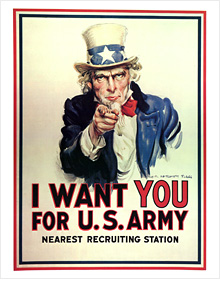Two wars, and it's still harder to get in
Joining the military isn't as easy as it used to be. Recruiters can now afford to be a little more selective in a dismal job market.
 |
| Uncle Sam wants you ... but are you good enough for Uncle Sam? |
NEW YORK (CNNMoney.com) -- Uncle Sam is getting picky.
Despite two wars, President Obama's 30,000 troop surge in Afghanistan and the Army's goal to swell its ranks by 15,000 this fiscal year, potential recruits are finding that it's a lot tougher to sign up.
"Military recruiting is through the roof," said Mackenzie Eaglen, a research fellow at the Heritage Foundation, a conservative think tank in Washington, D.C. "In fact, they're turning people away."
The dismal job market has put the armed forces in an enviable position. Unemployment is at a 26-year high of 10.2%, and the U.S. economy has lost 7.3 million jobs since the start of 2008. This has prompted many Americans to consider the military for work, despite the prospect of armed combat in Afghanistan or Iraq.
"It's just like any industry, when there's a glut of employees vying for a certain number of jobs, the employer can be a little bit more choosey," said Army spokesman Wayne Hall, a civilian at the Pentagon. "That's just the nature of supply and demand."
The Department of Defense said that all branches of the armed services -- the Army, Navy, Air Force and Marine Corps - met or exceeded recruitment goals in fiscal year 2009, which ended Sept. 30. That's the first time that's happened since 1973, when the draft ended and U.S. forces withdrew from Vietnam.
"We have tightened up our standards," said Army recruiting spokesman Douglas Smith, a civilian at Fort Knox, Ky. "There are types of waivers that we are currently not considering that we have considered in the past."
The Army is no longer giving second chances to recruits who fail the alcohol and drug tests, as it did during the height of the Iraq war several years ago, said Smith, nor is it providing waivers to overweight recruits or high school dropouts. The Army also no longer overlooks criminal infractions for even relatively minor offenses, like excessive parking tickets, he said.
"We've had such a dramatic increase in the unemployment rate in the last couple of years, it's clear that's had a dramatic effect," said Beth Asch, military recruiting expert for the Rand Corporation, a non-profit think tank based in Santa Monica, Calif. "It's clear that they're being picky. People who would have been marginal before are not being considered."
Applicants in 2009 were of an unusually high academic quality, according to the Army, which recruited 13,337 enlisted men and women with higher education, more than double the 2001 tally.
That included 523 recruits with master's degrees and 19 with post-doctorate degrees, compared with 2001, when the Army attracted 117 recruits with masters' degrees and none in the post-doctorate category.
The highly educated recruits probably entered the military as corporals or specialists making less than $22,000 a year, said Smith. Most enlisted personnel can expect to earn $1,568.70 a month by the end of their first year, which means an annual salary of $18,824.40, according to the DOD.
Asch said that workers at the top end of the educational scale are often involved in research, but a dearth in funding is prompting them to find work elsewhere, including the military.
"It's really breathtaking, to get someone with a doctorate degree," she said. "That's really unusual."
Sgt. 1st Class Marcus Pinkey, an Army recruiter in Carlisle, Penn. since 2002, said that some of the more seasoned recruits have an easier time adjusting to military life, because they've already experienced hardship.
"They know that it's something that they have to do for the survival for their family," he said.
He added that the vetting has gotten tougher, to ensure that recruits are committed to a military life.
"The screening process is a little more stringent, to make sure that people want to stay in for a longer period of time, instead of just waiting for the economy to get better," he said. ![]()

